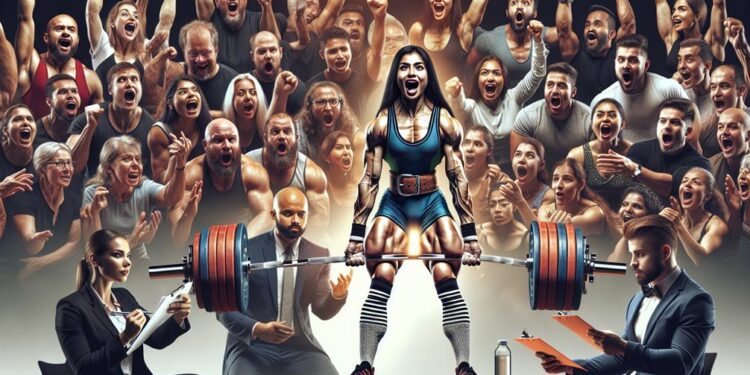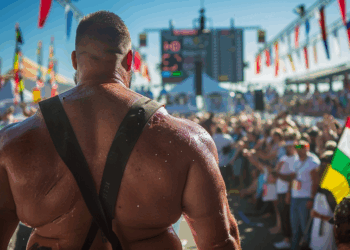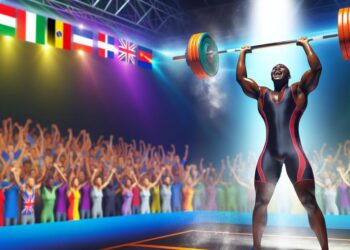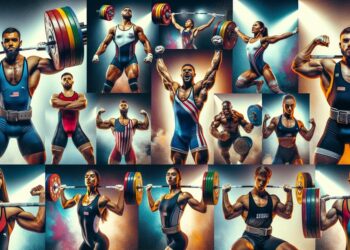Are you tired of struggling to break personal records in your powerlifting competitions? Well, imagine this: you step onto the platform, heart pounding, as you prepare to attempt a new personal best in the squat. The judges' eyes are fixed on you, and the audience holds its breath in anticipation. What can you do to ensure success in this crucial moment? In this discussion, we will explore the rules, events, and strategies of powerlifting competitions, providing you with the knowledge and tools you need to dominate the platform and achieve your lifting goals. So, let's dive into the world of powerlifting and discover the secrets to becoming a champion.
Key Takeaways
- Powerlifting competitions are scored based on the heaviest weight lifted in the squat, bench press, and deadlift, with the highest total winning.
- Lifters are allowed three attempts per lift, and the Wilks formula is used to level the playing field based on body weight.
- Proper nutrition, injury prevention, and rest and recovery are essential for powerlifting success.
- Mental preparation, including visualization, developing a positive mindset, and maintaining focus, is crucial for performing at one's best in powerlifting competitions.
Powerlifting Competition Rules
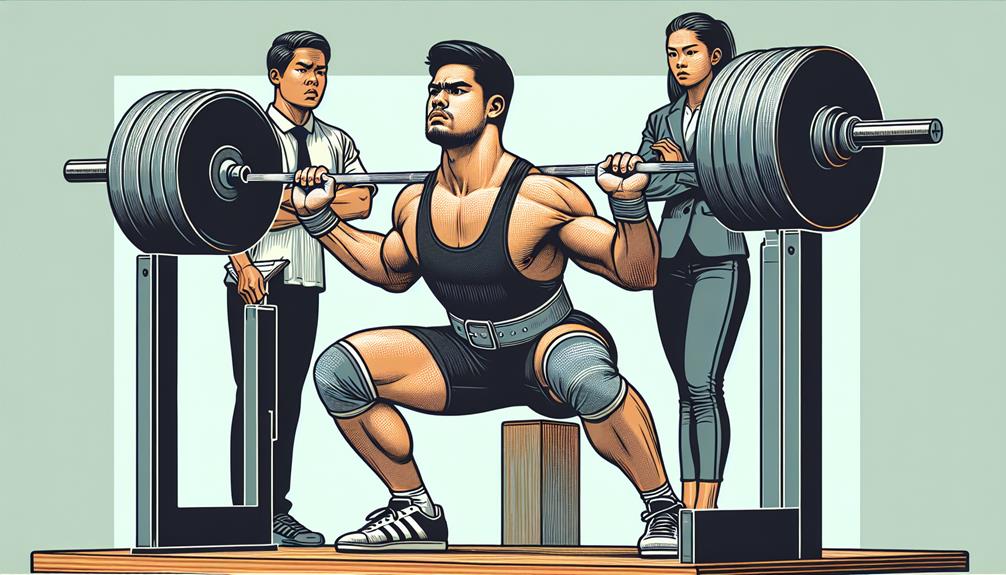
In powerlifting competitions, understanding and adhering to the specific rules is crucial for athletes to compete successfully and fairly. Let's dive into the rules of powerlifting competitions, including the scoring system and the equipment requirements.
When it comes to powerlifting competition scoring, the main objective is to lift the heaviest weight possible in three different lifts: the squat, bench press, and deadlift. Each lifter is allowed three attempts for each lift, and the heaviest successful lift in each category is added together to determine the lifter's total. The lifter with the highest total wins the competition. It is important to note that in some competitions, there may be additional scoring systems, such as the Wilks formula, which takes into account the lifter's body weight to level the playing field.
Now, let's talk about the equipment requirements in powerlifting competitions. The most essential piece of equipment is the barbell, which should weigh 20 kilograms for men and 15 kilograms for women. Lifters must also wear a singlet, a form-fitting one-piece garment, and appropriate footwear, usually flat-soled shoes like weightlifting shoes or sneakers. Additionally, lifters may use equipment such as wrist wraps, knee wraps, and a lifting belt to provide support and stability during the lifts. However, it's important to note that the use of performance-enhancing drugs or equipment that aids in lifting the weight is strictly prohibited.
Understanding the rules of powerlifting competitions, including the scoring system and equipment requirements, is essential for athletes to compete fairly and effectively. Make sure to familiarize yourself with these rules before stepping onto the competition platform to maximize your chances of success.
Key Powerlifting Events
Now that you understand the rules and equipment requirements of powerlifting competitions, let's explore the exciting world of key powerlifting events. Powerlifting competitions are divided into various categories based on gender, age, and weight class. These categories ensure fair competition and allow lifters to compete against others with similar abilities and body types.
In powerlifting competitions, there are three main events that participants compete in:
- Squat: This event tests the lower body strength and involves lifting the heaviest weight possible while performing a full squat and then standing back up.
- Bench Press: In this event, competitors lie on a bench and lift the heaviest weight they can while keeping their feet on the ground and their buttocks in contact with the bench.
- Deadlift: The deadlift event focuses on testing the strength of the lower back, legs, and grip. Lifters lift the heaviest weight possible from the floor to a standing position.
Aside from the physical aspect of powerlifting, nutrition plays a crucial role in competitions. Proper nutrition before, during, and after the event is essential for optimal performance. Adequate fueling and hydration help maintain energy levels, enhance muscle recovery, and prevent fatigue.
Understanding the different powerlifting competition categories and the importance of nutrition will contribute to a successful and rewarding experience in these exciting events.
Effective Powerlifting Strategies
To excel in powerlifting competitions, it is crucial to implement effective strategies that maximize your strength and performance. Two key areas to focus on are nutrition and injury prevention. Proper nutrition plays a vital role in fueling your body and optimizing your performance. Make sure to consume a well-balanced diet that includes a mix of carbohydrates, proteins, and fats. Prioritize lean proteins such as chicken, fish, and tofu to support muscle growth and repair. Complex carbohydrates like whole grains, fruits, and vegetables provide sustained energy throughout your workouts. Healthy fats from sources like avocados, nuts, and olive oil help with hormone production and joint lubrication. Additionally, stay hydrated by drinking plenty of water throughout the day.
Injury prevention is another crucial aspect of powerlifting strategies. Warm up properly before each training session to loosen your muscles and increase blood flow. Incorporate dynamic stretches and mobility exercises to improve your range of motion and prevent muscle imbalances. It is also important to listen to your body and avoid overtraining. Rest and recovery days are just as important as training days, allowing your muscles to repair and grow stronger. Lastly, practicing proper form and technique is essential to avoid injuries. Seek guidance from a qualified coach or trainer to ensure you are using the correct lifting technique and gradually increase weights to avoid unnecessary strain.
Training for Powerlifting Competitions
Are you ready to take your powerlifting training to the next level and prepare for competitions? Here are some key tips to help you train effectively and optimize your performance on the platform:
- Strength training techniques: To excel in powerlifting competitions, it is crucial to focus on specific strength training techniques. Incorporate exercises that target the three main powerlifting lifts: squat, bench press, and deadlift. Implement progressive overload, varying rep ranges, and accessory exercises to build strength and improve technique.
- Nutrition for powerlifters: Proper nutrition is essential for optimizing performance and supporting recovery. Make sure to consume a well-balanced diet with adequate protein to promote muscle growth and repair. Fuel your body with complex carbohydrates for sustained energy and healthy fats for hormone production. Stay hydrated and consider incorporating supplements like creatine and omega-3 fatty acids to enhance performance and aid in recovery.
- Rest and recovery: Powerlifting competitions can be physically demanding, so it's important to prioritize rest and recovery. Allow for sufficient sleep to support muscle repair and growth. Incorporate rest days into your training schedule to prevent overtraining and reduce the risk of injury. Additionally, consider incorporating techniques such as foam rolling, stretching, and massage to promote muscle recovery.
Mental Preparation for Powerlifting Success

As you prepare to step onto the powerlifting platform, it's time to strengthen not just your muscles, but also your mental game for optimal success. Mental toughness is crucial in powerlifting competitions, as it allows you to push through physical barriers and perform at your best. To develop mental toughness, it's important to train your mind just as you train your body. One effective technique is visualization. By vividly imagining yourself successfully completing your lifts, you can enhance your confidence and focus. Take some time before your competition to visualize yourself executing flawless lifts, feeling the weight in your hands, and hearing the cheers of the crowd. This visualization technique helps your brain create neural pathways that simulate the actual performance, making it feel more familiar and achievable. Another aspect of mental preparation is developing a positive mindset. Stay optimistic and believe in your abilities. Instead of dwelling on negative thoughts or doubts, replace them with positive affirmations. Remind yourself of your hard work, dedication, and progress. Surround yourself with positive and supportive people who can help boost your confidence. Remember, powerlifting is not just about physical strength; it's also about mental strength. So, as you step onto that platform, be mentally prepared to conquer any challenge that comes your way.
Frequently Asked Questions
Are There Any Weight Restrictions for Powerlifting Competitions?
Yes, there are weight restrictions in powerlifting competitions. Athletes are divided into different weight categories to ensure fair competition. Additionally, the use of prohibited substances is strictly prohibited to maintain a level playing field.
What Is the Difference Between Powerlifting and Olympic Weightlifting?
Powerlifting is focused on the three main lifts: squat, bench press, and deadlift. Olympic weightlifting, on the other hand, emphasizes the snatch and clean and jerk. They have different goals and techniques.
Can Powerlifting Competitions Be Done in Teams or Is It Strictly Individual?
In team-based powerlifting competitions, you and your teammates work together to lift heavy weights and score points. However, individual powerlifting competitions have their advantages too, allowing you to focus solely on your own performance and progress.
Is There a Minimum Age Requirement to Participate in Powerlifting Competitions?
In powerlifting competitions, there is typically a minimum age requirement to participate. This ensures that participants meet the eligibility criteria and are physically prepared for the demands of the sport.
Are There Any Specific Dietary Guidelines or Recommendations for Powerlifters Before a Competition?
Before a powerlifting competition, it's important to focus on pre-competition nutrition. You should aim to eat a well-balanced diet with adequate protein, carbs, and fats. Some powerlifters may also benefit from supplements like creatine or caffeine.
Conclusion
So there you have it, my friend! Powerlifting competitions may seem daunting, but with the right knowledge and preparation, you can conquer the platform. Remember the adage, "Practice makes perfect." Keep pushing yourself in training, focus on effective strategies, and prepare yourself mentally for success. With these tools in your arsenal, you'll be ready to dominate the powerlifting world and achieve your goals. Good luck and keep lifting strong!


